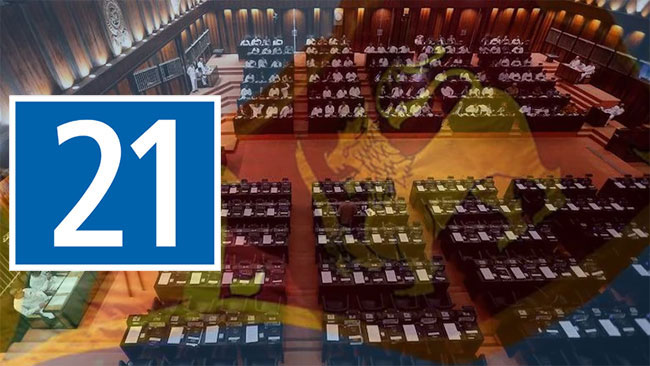The Supreme Court (SC) has determined that several clauses in the 21st Amendment to the Constitution Bill submitted by the main Parliamentary Opposition, the Samagi Jana Balawegayas (SJB), are inconsistent with the Constitution, and that it needs a people’s referendum to be passed, while the Government’s 22nd Amendment to the Constitution Bill will be sent to the Attorney General’s (AG) Department soon.
Cabinet Spokesperson Dr. Bandula Gunawardana, addressing the weekly press briefing held to announce Cabinet decisions yesterday (21), said that Cabinet approval was granted to the 22nd Amendment to the Constitution Bill on Monday (20), and that it will now be sent to the Legal Draftsman’s Department and the AG’s Department.
Meanwhile, Speaker of the House Mahinda Yapa Abeywardena announced in Parliament yesterday that he had received the SC’s determination on the 21st Amendment to the Constitution Bill put forward by the SJB. Thus, he said that the SC has determined that Clauses 2-15, 19, 23, 24, 26-28, 30(a), 36, 39, 43, and 51 of the SJB’s 21st Amendment to the Constitution Bill are inconsistent with a number of provisions of the Constitution, and has therefore ordered that a people’s referendum be held for them to be passed.
Speaking in Parliament yesterday, Minister of Justice and Constitutional Reforms Dr. Wijeyadasa Rajapakshe PC claimed that the SC has determined that no clause in the said SJB Bill can be passed in Parliament without a public referendum and that the Opposition has to therefore accept the practicality of the situation.
“The Opposition and even some experts have asked as to whether the proposed 21st Amendment to the Constitution is necessary. The proposed 21st Amendment to the Constitution is a necessary solution to addressing the current problems. When we talk with the International Monetary Fund (IMF) and the European Union (EU), they ask us where our democracy is, and they ask us to build it.
“During the course of last month, we spoke with all party leaders in and out of the Parliament, and with embassies, religious leaders, trade unions, and civil society organisations. We took all their ideas and everyone agreed to put in an Amendment similar to the 19th Amendment to the Constitution. We believe that the Bill that the Government has presented is practical, as we cannot chase after mirages,” Dr. Rajapakshe PC said.
With regard to the 22nd Amendment to the Constitution Bill presented by the Government, Dr. Rajapakshe PC said that they have done what they can.
Also addressing the same media briefing yesterday, Minister of Agriculture and Wildlife and Forest Resources Conservation Mahinda Amaraweera said that the Government expects the Parliament’s full support to pass the 22nd Amendment to the Constitution Bill.
“Many main things have been included in the 22nd Amendment to the Constitution Bill to widen democracy, including the establishment of an Audit Commission and other independent commissions,” he said.
The 19th Amendment to the Constitution was passed in 2015, seeking a dilution of the powers of the Executive Presidency. However, the 20th Amendment to the Constitution, passed in 2020, dilutes the powers of the Prime Minister and the Cabinet of Ministers, thus consolidating more power in the hands of the Executive President.


